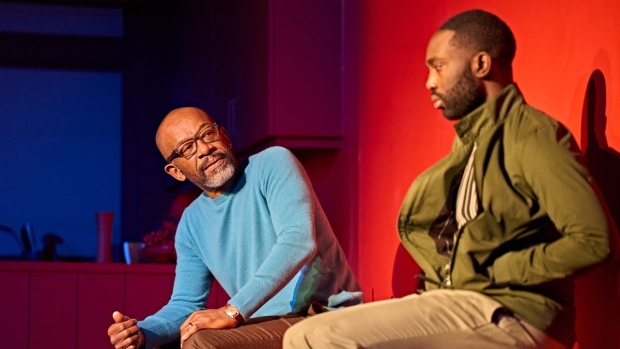A Number with Paapa Essiedu and Lennie James at the Old Vic – review

© Manuel Harlan
As time goes on, Caryl Churchill's play, premiered in 2002, looks more and more like a masterpiece. It lasts just over an hour yet in five short scenes between two actors it unravels a world of troubling care.
This production, directed by Lyndsey Turner, and starring Paapa Essiedu and Lennie James, ratchets up its tensions and questions to breaking point, making its exploration of parenting, of fathers and sons, and of what it is to be human, feel so emotionally pressing that it is almost suffocating to watch.
The play begins when Bernard 2 comes home to his father Salter with the troubling news that he has discovered he is a clone. There are a number of him out there. The question that bothers him, is was he the first, the original son from whom all others have sprung. In the next scene, we discover that he wasn't; the angrier Bernard 1 turns up to stake his claim to his birth right and to express all his sorrow and fury that his father rejected him, and accidentally set in train a scientific experiment which has resulted in multiple versions of him wandering the earth.
The biblical parallels are called to mind by Es Devlin's accusatory set, a realistically designed kitchen coloured deep crimson. But although Cain and Abel clearly stalk both the text and the production, its true strength lies in the way that it gives such weight and heft to the psychological damage inflicted by Salter's original sin.
With incredible detail, James turns him into a house-proud fusspot, visibly flinching not when Bernard reveals his shock and confusion at discovering there is more than one of him, but when he leaves his trainers in the middle of the floor. He has convinced himself he is a good father, with a perfect son. "You're the one," he assures him, as if he can make everything as neat as the home he has created.
As a different picture gradually emerges, James' intensity increases. It's a very still performance, but entirely focused. He longs for expiation, yet the moment he kneels in front of the son he has traumatised and neglected, he asks not for forgiveness but for the boy's memory of the moment he was taken into care.
Essiedu's sudden exhalation of breath, as if he is about to explode, compresses the man's suffering into a single image. This Bernard may be dark and violent, but we begin to understand why. His agony is written into his body, into his tight stance, his staccato delivery. The changes from one man to the next – and finally to Michael, a gentle American who is untroubled by his genetic inheritance – are accomplished with almost miraculous ease with the help of Tim Lutkin's dazzling lighting and Natalie Price's clever costumes. But Essiedu's transformations are more than physical; he superbly finds a different way of playing each man, letting the differences in their personalities shape their being.
By pulling the family dynamics to the fore, Turner lets the big themes that power the play speak even more powerfully. This is above all a work about what defines an individual being, about the balance between the moral choices we make and our DNA.
When Salter, in desperation, finally asks Michael to define the essence of himself, the answer he gets is: "I like blue socks." It's Churchill's genius that she can combine the comic and the tragic in a single scene; this production serves her vision superlatively.












